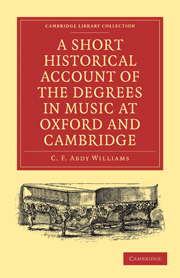 A Short Historical Account of the Degrees in Music at Oxford and Cambridge
A Short Historical Account of the Degrees in Music at Oxford and Cambridge Published online by Cambridge University Press: 05 October 2010
Music formed an important element in Mediæval education, whether it was studied with a view to the taking of a musical degree or not. By the Oxford Statutes of 1431 arithmetic and music were each to be studied for one year, in addition to the other subjects necessary for the degree of Master of Arts. Astronomy and geometry are to be studied only two terms each, being evidently considered of inferior value to arithmetic and music. The books of Boethius were required for the degree of Bachelor in Music, as well as for that of M.A., but apparently the graduate in music was expected to have a larger knowledge of them than the M.A., and was permitted to lecture on any of them. But all clerks were expected to “bene con, bene can, and bene le”—i.e., “construe well, sing well, and read well”;—and we have ample evidence that instruction in singing was provided for all the junior members of the Universities. On the fifth Thursday in Lent all determiners were examined in “Songe and wryhtynge.” The statutes of Clare Hall, which was founded 1359, require that the sizars shall be represented by ten docile, proper, and respectable youths, who are to be educated in singing, grammar, and logic; and that every Sunday and Holy-Day the fellows and sizars are to attend High Mass and sing at it. At Oxford, every master was, by the statutes of 1356, expected to attend High Mass at St. Mary's Church at the commencement and conclusion of every academical year, and provision was made for suitable vestments and proper behaviour on their part.
To save this book to your Kindle, first ensure no-reply@cambridge.org is added to your Approved Personal Document E-mail List under your Personal Document Settings on the Manage Your Content and Devices page of your Amazon account. Then enter the ‘name’ part of your Kindle email address below. Find out more about saving to your Kindle.
Note you can select to save to either the @free.kindle.com or @kindle.com variations. ‘@free.kindle.com’ emails are free but can only be saved to your device when it is connected to wi-fi. ‘@kindle.com’ emails can be delivered even when you are not connected to wi-fi, but note that service fees apply.
Find out more about the Kindle Personal Document Service.
To save content items to your account, please confirm that you agree to abide by our usage policies. If this is the first time you use this feature, you will be asked to authorise Cambridge Core to connect with your account. Find out more about saving content to Dropbox.
To save content items to your account, please confirm that you agree to abide by our usage policies. If this is the first time you use this feature, you will be asked to authorise Cambridge Core to connect with your account. Find out more about saving content to Google Drive.